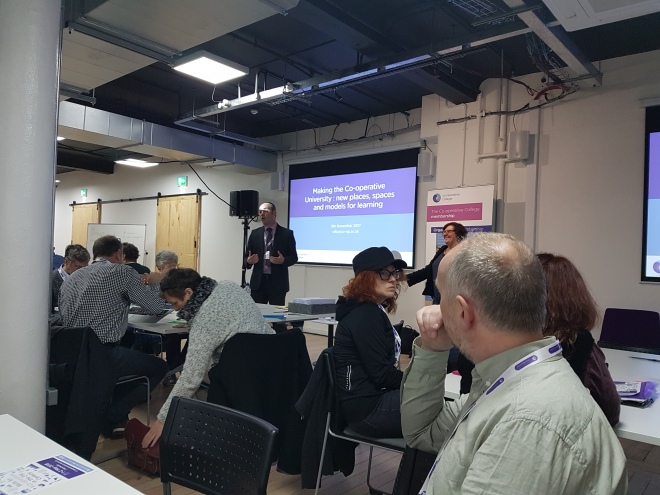
#coopuni event, 9 Nov 2017, Manchester
I attended the inaugural event about a future Cooperative University as I was intrigued to find out more about it. Could a cooperative university present an attractive alternative higher education model? Thank you Ronnie for bringing this event to my attention.
A cooperative university, is a thought provoking idea. But what is the need for such a university? What would it achieve that other universities don’t and how? Is an alternative higher education needed and could such a university progressively transform existing institutions? Is this desirable? Are there opportunities within existing universities to have cooperative clusters, for example? How about open cooperatives?
I was looking forward to find out more about the cooperative university and meet Ronnie Macintyre my open practitioner buddy and others who have a vision to create alternative higher education opportunities through democratic participation. However, is this not what open education is also working towards? How does the idea for a cooperative university link to the ethos and values of open education?
Furthermore, I was interested in finding out how my practice and research in open education (Nerantzi, 2017) and particularly in open and cross-institutional academic development and collaborative open learning relates to cooperative ideas and the cooperative movement.
The aims of the day as communicated at the opening of the day were
> bring ideas together
> facilitate a mutually supportive environment
> establish a co-operative higher education forum (CHEF)
From the delegates list, I could see we were around 90 from a range of backgrounds. In the morning, after an introduction to the history of the cooperative college and related activities especially since 2010, a range of cooperative projects from across the UK were shared. After listening carefully, I think what is different in these educational initiatives is how they operate.
This is what I noticed: I can see how they are (more) cooperative. Or are they actually collaborative? I don’t know much, or very little I should say about the governance dimension of cooperatives. This is something I would like to find out more to better understand what this is all about. But I suspect that the area of governance is what differentiates a cooperative from other initiatives and businesses. It seems to me that cooperatives have the community at the heart, the collective. They aim to empower individuals but also the cooperative as a whole. The cooperative as a community. I think also to create a sense of belonging. The example from Spain of the cooperative University of Mandragora illustrated this really well through its flat structures, autonomy of faculties and the lived and dynamic culture of innovation in learning, teaching and research. It was refreshing to hear about this model that was not just an idea but something that was implemented and working. I would have liked to ask questions especially around the challenges and how these are resolved but we watched a recording so this opportunity was not there. I will have a look online to find some more information about this university as well as related research.
In the earlier examples, learning for life and for learning’s sake where mentioned, often as an alternative model to a focus on employability which is often the case in universities. While I can see value in empowering individuals to love learning, often the people we would hope to reach, are the ones who might be disadvantaged and helping them get a job would be a great achievement. Otherwise, I think otherwise any cooperative university could become exclusive and elitist? Don’t know where these thoughts are taking me now but it is something that popped into my head and wanted to share.
I can see the potential links between the idea for a cooperative university and open education but I struggle to articulate them. Could the cooperative movement provide an attractive business model for open education? Could you have open cooperatives? Not sure if business model is the right term here… but is there an opportunity to marry the two?
As I was seeing the links between open and cooperatives, it was obvious to me. I was expecting to hear something around open education, open practices, open educational resources, open badges but none of the examples shared mentioned something related. The ecological university (Barnett, 2016) and learning ecologies (Jackson, 2016) also didn’t feature. And what about the Porous University (Lennon, 2010; Macintyre, 2016). These concepts don’t promise new higher education institutions but propose to transform the existing ones from within. At least this is my understanding.
Because none of the above were not mentioned during the day, does of course not mean that the links have not been made. I need to do some reading!!! The ethos and values of open education, however, were at the heart of the initiatives that were shared. I am wondering if there is an opportunity or even a need to closer link up cooperative and open learning? What about collaboration? It was hardly mentioned… Also, are the UNESCO and the 17 Sustainable Development Goals relevant to a cooperative university?
Themes that provided discussion foci in the afternoon workshops were the following:
> Democracy, members and governance
> Knowledge, curriculum and pedagogy
> Livelihood and finances
> Bureaucracy and accreditation
I joined the pedagogy group in the afternoon as I felt that my interests would fit best but wondering now if the workshop around Democracy, members and governance would have been useful too. Would this have given me a flavour of what this is all about? We all had questions. I had more questions at the end of the workshop than at the beginning which really made me think hard about what a cooperative university would be about. I am searching for an answer myself and with others in some of the discussions we had. I think more work needs to be done to articulate the purpose and vision for a cooperative university before embarking on defining a specific pedagogical model. I think the working group that has been set-up has this purpose. Something much more organic, flexible or even elastic and open, is needed that would give learners choice. Choice to pursue what they want. And while there were some discussions that the courses might not be accredited… I think accreditation is still very important, especially in cases where such an accreditation of learning through the cooperative university would be a lifeline and not a luxury some individuals can easily find or afford elsewhere. There were mixed views about the use of technology in a cooperative university and my thoughts are that for some the online engagement might be the only viable option, for others it might not work. If such a university is going to empower the ones in real need to engage in learning, they should also have access and be able to work towards accreditation, if they wish. In my mind, a cooperative university shouldn’t be a second or third class university. And I am thinking here of providing access to education to homeless citizens for example for whom such education would give new hope and a new positive purpose in life and help them return to become contributing members of our society.
During the day, I did a lot of listening. What hooked me was the idea of and for positive disruption and making big ideas happen. But what are these big ideas linked to the cooperative university? Have they been articulated? Are they still work-in-progress? I was searching for some of them myself and in discussions with others. What makes a good idea, a big idea that gives it importance, urgency and empowers us to act?
Thank you to all organisers for a thought provoking day. Ronnie also reflected on the day and you can read his thoughts here. An article about this event was also published in THE.
Maybe there is now an opportunity to come together to draw our cooperative university or make a model of it. Such playful and pan-participatory approaches have the potential to release our inner big ideas… share them with others so that we can link them, develop them into concepts and make them happen… together…
References
Barnett, R. (2011) The coming of the ecological university, Journal Oxford Review of Education, Volume 37, Issue 4, pp. 439-455, available at http://www.tandfonline.com/doi/abs/10.1080/03054985.2011.595550
Jackson, N. (2016) Exploring learning ecologies, Chalk Mountain
Lennon, E. (2010) ‘The Porous University‘, New Perspectives: Arts and Humanities Enter a New Phase, London: Times Higher, Supplement on Trinity College London
Mackintyre, R. (2016) The Porous University, RoughBounds, 9 November 2016, available at https://roughbounds.wordpress.com/2016/11/09/the-porous-university/
Nerantzi, C (2017) Towards a framework for cross-boundary collaborative open learning for cross-institutional academic development, PhD thesis, Edinburgh Napier University: Edinburgh

